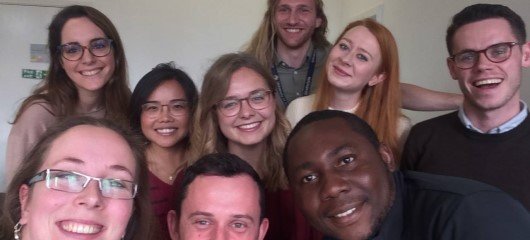Erika Solimeo, LLM Student in Global Environment Law (2017-2018)
When I first read on the University website that Strathclyde was “the place of useful learning”, I could not imagine that my experience as a student could drive me towards such an innovative and practical approach to knowledge.
The most cutting-edge aspect about the LLM in Global Environmental Law and Governance, which was first launched in 2017, has been the comprehensive way in which environmental law and governance are conceptualised. Within a context of the strict interrelationship between national, regional and international dimensions, the inclusive approach embraced by the course has been further strengthened by the professional expertise and collaborations that Professors and Researchers have with domestic, EU and international institutions. These aspects have made classes not only stimulating occasions for debating the lessons learnt in the field, but equally concrete opportunities for students to be part of the dynamic and progressive development of the law. In this sense, the increasing traction that a global dimension of environmental legal issues has gained recently represents an additional value of the programme.
Besides pragmatic teaching methods, what makes the LLM course truly unique is the active presence of the Strathclyde Centre for Environmental Law and Governance (SCELG), which constantly creates opportunities for networking with the academic, institutional, non-governmental and entrepreneurial world. In only one year, I have been able to participate in a multiplicity of workshops and events organised by the Centre, such as the Symposium on Global Environmental Law (September 2017); “Environmental Litigation in the Anthropocene – Friend or foe to delivering the Sustainable Development Goals? (October 2017); Projecting Transboundary Conservation into the Future: the Impact of Law and Governance in Fulfilling Environment’s Role in Peace Building (February 2018); the 2018 Festival of Environmental Law & Governance (May 2018); the 16th Annual Colloquium of the IUCN Academy of Environmental Law - Transformation of Environmental Law and Governance: Innovation, Risk and Resilience (July 2018).
They have all represented valuable experiences for personal and professional growth, as well as for reflection and debate about the practical aspects of different career paths.
Moreover, the constant willingness from the entire SCELG team, and specifically from Professor Elisa Morgera, to maximise postgraduates’ ambitions and create bridges between them and legal experts, in my own personal case has facilitated a nine-month internship, from November 2017 to July 2018, with a Scottish based environmental law firm: Living Law.
Based on the recognised professionalism and multi-year experience in international litigation and access to justice of its managing partner, Ms. Susan Shaw, the experience at Living Law has been extremely valuable and allowed me to complete my path of Italian trainee lawyer with a placement in a common law viewpoint. We are told by the Law Society of Scotland that this is the first time such an exchange has been undertaken in Scotland.
Besides the exposure to environmental legal cases, which has been reinvigorated by the recent decision on fracking in Scotland, Ms. Shaw’s enthusiasm to share with her interns every aspects of the profession led me to take part in a variety of meetings with clients and partners (such as environmental NGOs) and learn from her expertise about how to maximise legal strategy and advocacy, in the interests of clients. In addition, I have also gained insights into key legal and ethical considerations for Scottish solicitors, such as confidentiality requirements.
From a research perspective, the legal challenges that environmental protection in the UK is facing in the Brexit context has undoubtedly represented an immense chance to comprehend in practice the importance of solid and coherent environmental legal frameworks, at the national, EU and international level and how legal argumentations have steered the political debate.
In this sense, I have been involved in a collaborative analysis on the implications of principles of sovereignty, non-regression, progression, legal uncertainty, environmental safeguarding with specific reference to the (at that time) EU Withdrawal Bill (now Act). Particularly stimulating has been also the preparation for the evidence before the Environmental Audit Committee on the Government's 25-Year Plan for the Environment, which took place in London in March 2018.
The experience at Living Law has revealed fascinating also in terms of critically approaching topical legal issues, and reflecting upon creative solutions to be shared with both wider groups of legal experts and the general public.
In details, the position of Official Observer to the UN Minamata Convention on Mercury that the law firm has attained in 2017, represented a unique opportunity to deepen the achievements reached at the end of the first Conference of the Parties. These aspects, intertwined with the legal implications of the UK and EU ratification of the Convention, have been formalised into a short legal report published at the Living Law’s website in January 2018 and titled “Looking back to highlights from CoP1 of the UN Minamata Convention as new EU Regulation 2017/852 on mercury enters into force today”.
Incredibly enriching has been also the process of researching the strict connection between human rights and environmental rights. Building on the far-reaching Framework Principles proposed by the former UN Special Rapporteur on Human Rights and the Environment, John Knox, I have contributed to sharing with the wider audience the current stage of interpretation and implementation of the Right to a Safe and Healthy Environment. That effort, included in a video blog update (Case Law Update: Developments in other Jurisdictions on the Right to a Safe and Healthy Environment), was intended to highlight the increasing number of national jurisdictions that have expressly recognised environmental rights as constitutional rights and consequently maximised the implementation of human entitlements. Again, thereby illustrating the opportunities for legal research and analysis to help provide solutions to everyday environmental challenges.
But the experience that really exceeded my initial expectations has been the legal study on nature rights that, as part of the Living Law team, I had the honour to lead, under the supervision of Ms. Shaw and through a collaboration with a network of specialist international professionals. The analysis, that took five months before being formalised in a comprehensive Law and Policy briefing “Giving Nature a Voice”, intersects the innovative legal developments from national jurisdictions with the increasing traction that Rights of/for Nature have been achieving at the international scale. As the paper aims to encourage new legal approaches in the UK and spread the debate on nature rights also within the EU borders, it has been incredibly formative also being involved in the consequent network phase, which led me to come in contact, directly or indirectly, with leading legal experts on Earth Jurisprudence. Besides those connections, that have recently welcomed Susan Shaw among the few UK members part of the UN legal expert network on Harmony with Nature, the contextual publication of a short video blog has also helped me developing targeted communication skills, in order to increase the general awareness on that topic to a wider non-legal audience.
Undoubtedly, the time in which I have approached Living Law has been extremely opportune to assist in person with the fast-moving pieces characterising the environmental legal framework, both in the national and international arena. Equally, my personal experience in the law firm would not have been so enriching without Ms. Shaw’s innovative approach to the legal profession and her constant intention to maximise her interns’ exposure to topical issues and new challenges, which have revealed fundamental to nourish entrepreneurial spirit and improve critical analysis.
In conclusion, reflecting upon the wide range of opportunities, chances, and connections I had the chance to experience during the time of the LLM in Glasgow, I can simply encourage everybody in search for academic, professional and personal motivation to reach the SCELG team.
Moving far beyond a traditional legal thinking and thanks to the rich network of partnerships it is based upon, at the Centre I have found a cooperative environment where postgraduates are sincerely welcomed to be part of a bigger team of legal experts. With reference to this aspect, I cannot omit my astonishment when the International Institute for Environment and Development (IIED) has shown its interest in including the legal argumentations used in my final dissertation on deep sea-bed mining into a formal blog. The collaboration with the Institute, that has been recently formalised in a small contribution co-authored by Brendan Schwartz and titled “Mining in the deep-sea bed: are we ready?”, further reiterates the active intention of the University of Strathclyde and its Centre to maximise their students’ potential.



